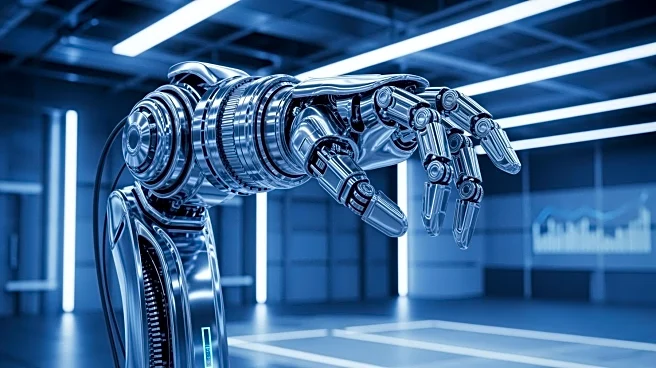What's Happening?
Elon Musk, CEO of Tesla, has expressed his desire to maintain strong influence over the company's ambitious Optimus robot project. During a recent Tesla earnings call, Musk discussed the future of these
humanoid robots, which he envisions as transformative for the job market and society. He emphasized the importance of having significant voting control at Tesla to ensure his influence over the development and deployment of these robots. Musk's vision includes delivering 1 million Optimus robots, alongside achieving other ambitious metrics such as 20 million vehicle deliveries and a valuation of $8.5 trillion. The proposal for Musk's compensation package, which includes a potential $1 trillion payout over the next decade, is contingent on meeting these targets.
Why It's Important?
Musk's focus on the Optimus robot project highlights Tesla's expansion beyond electric vehicles into artificial intelligence and robotics. This development could significantly impact various industries, potentially revolutionizing labor markets by automating tasks traditionally performed by humans. The prospect of widespread robot deployment raises questions about job displacement and economic shifts. Additionally, Musk's emphasis on maintaining influence over the project underscores the strategic importance of these robots to Tesla's future growth and valuation. Stakeholders, including investors and policymakers, will be closely monitoring the implications of this technological advancement on employment and economic structures.
What's Next?
Tesla shareholders are set to vote on the proposed compensation package for Musk in November, which will determine his future control and influence over the company. The outcome of this vote could shape Tesla's strategic direction and its ability to achieve the ambitious goals set by Musk. As the Optimus project progresses, potential reactions from labor groups, regulatory bodies, and industry competitors are anticipated, given the transformative nature of humanoid robots. The development and deployment of these robots will likely prompt discussions on ethical considerations, regulatory frameworks, and societal impacts.
Beyond the Headlines
The introduction of humanoid robots like Optimus could lead to long-term shifts in societal norms and economic structures. Ethical considerations regarding the role of robots in healthcare, employment, and daily life will become increasingly relevant. The potential for robots to perform complex tasks, such as surgery, raises questions about the future of human labor and the balance between technological advancement and societal well-being. As Tesla continues to innovate, the broader implications of its projects will be scrutinized by various stakeholders.












